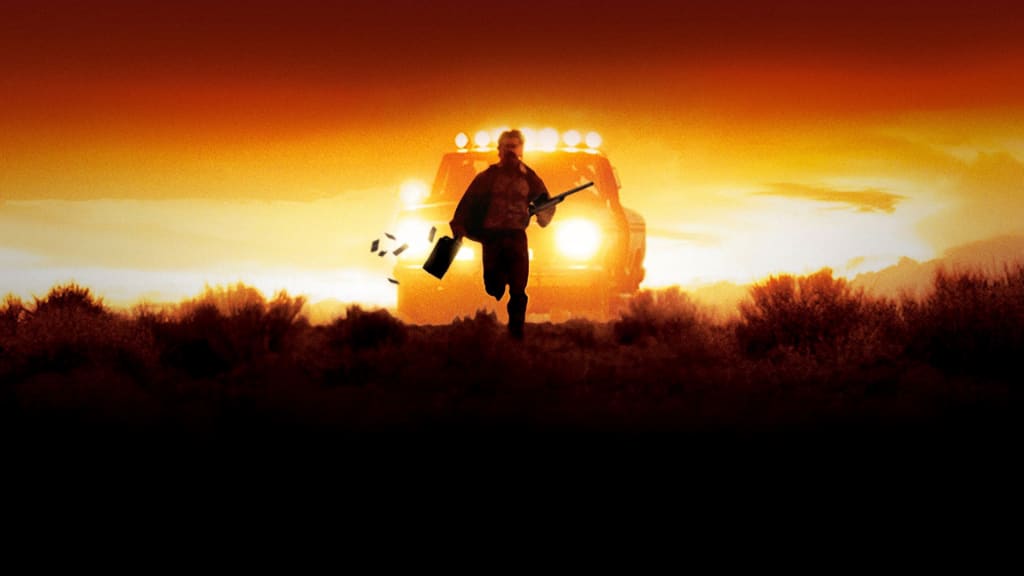No Country for Old Men: What was it all about?
Let's look at the Coen brother's critically acclaimed masterpiece.

'No Country For Old Men' is a 2007 film, directed by Joel and Ethan Coen, starring Josh Brolin, Javier Bardem, Woody Harrelson and Tommy Lee Jones. Following Llewelyn Moss (Josh Brolin) on the run after he finds and takes a briefcase filled with 2 million dollars, the film deals with themes of fate and consequence, similar to other Coen brother films. With incredible performances all round, its Javier Bardem's portrayal of the psychopathic killer Anton Chigurh that stands out amongst the rest and has gone down in history as one of the best performances of all time. Roger Deakin's cinematography is (as usual) stunning and the lack of music only adds to the intense realism. Adored by fans and critics alike, 'No Country For Old Men' is often accompanied by mountains of praise and respect.
So what was it all about? Why would anyone have any problems with it? Let's take a look.
The film's plot is best understood after multiple viewings and requires quite a bit of focus to keep up with the plot. There are several scenes that don't seem relevant to the film whatsoever until you dig a little deeper and many have raised complaints concerning the abrupt and odd ending. I admit I disliked the ending when I first watched the film. It felt rushed and drawn out all at the same time as well as a little pretentious; the final words spoken by Tommy Lee Jones meant nothing to me until after I rewatched the film a few times. This is a common, and very reasonable complaint, yet it's also one of the movies greatest strengths. 'No Country For Old Men' demands your attention and doesn't bother watering itself down for easier consumption.
This doesn't change the fact that this film is, by all accounts, a slow-burner, and for a lot of people that's just not their cup of tea. Films, with all their art and purpose, are still made to entertain and people are entertained in different ways.

There is a timeless feel to 'No Country For Old Men' due to both its simplicity and its profound exploration of important topics. The films biblical influences are constantly present but can often come across as vague and difficult to interpret. I find it's best to not concern yourself with the morality of Llewelyn; he's neither a good, nor a bad man. Anton Chigurh acts as a satan-like figure, opposing Ed Tom Bell's (Tommy Lee Jones) Christ-like virtues. It easiest to see it as this;
Tommy Lee Jones= God Javier Bardem= Satan
Both are fighting for Llewelyn's soul as he struggles with the consequences of his mistakes and choices. Ed Tom Bell tries in vain to bring him back from the clutches of darkness as he attempts to forge his own path, separate from both good and evil. Although slightly pessimistic, the film tells us there is no middle ground and sooner or later, life catches up with you.
This is a great example of the Coen brothers mature interpretation of the meaning of fate and even God. Llewelyn's decision to be kind and return with water for a dying Mexican, results in him being shot and his identity becoming known. As well as this, Llewelyn is also not the 'hero' of this story, despite being the main character. His wife is. Throughout the film we see Chigurh consider himself as simply an act of fate; thus the constant coin tosses and subsequently the irregularities of his murders. He is able to detach himself from the killing by pretending he has no say in the outcome.
In one of the final scenes Carla Jean (Kelly Macdonald), Llewelyn's wife refuses to pick heads or tails, deconstructing Chigurh's philosophy entirely. By refusing to play his game, her fate rests in his hands, as did all his victims. This is evident by the car crashing into Chigurh randomly - throughout the film he s referred to as a ghost or some non-human creature acting out fate instead of being subject to it. Carla Jean's refusal to play his game results in a random act of fate nearly killing him ie. the car crash. He is not some evil entity, but a man, subject to the same randomness that everyone else is.

Throughout the film Ed Tom Bell is concerned about, not only his place in a world he can no longer understand, but the world in general. His old-fashioned outlook on life, leads him to question his ability to protect and serve and to his inevitable retiring. This is where the title comes into play. Chigurh's clinical approach to death along with the randomness of his killings, confuses Ed Tom Bell as he only know what his father, the previous sheriff, taught him. He feels he has no place left in this world (or rather, this country) and retires.
This is why the ending, in which Tommy Lee Jones describes two dreams he had to his wife, is so poetic, profound and loved by fans. Confused by it when I first saw the film, I struggled to see the relevance in his stories. His first dream is in some ways irrelevant, reminding the audience he regrets not saving Llewelyn from getting shot. He talks about losing some money his father lent to him, indicating the loss of Llewelyn's life. In the second dream he describes his father riding his horse on past him with a blanket over his head, amidst the cold and the dark. He's aiming to make a fire out there and Ed Tom Bell knows that when he gets there he'll be waiting for him. And then he woke up.
This can be taken in several different ways. My interpretation however relies on the importance of the final line, "And then I woke up". His father is aiming to make a fire onwards and he's going to be there when he reaches it. You can take the place to be a form of heaven or a kind of afterlife, but the main point is that it doesn't exist on earth. There is no country for old men, outside of dreams and prayers. The world will always move on and we must do our best to keep up with it; otherwise we are lost, stumbling in the cold and dark to a place that doesn't exist.
About the Creator
Ciarán Coleman
'There's no time for hatred, only questions
What is love, where is happiness
What is life, where is peace?
When will I find the strength to bring me release?'
- Jeff Buckley
Interested in me writing for you?
Gmail; [email protected]






Comments
There are no comments for this story
Be the first to respond and start the conversation.